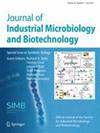针对蛋白酶体和 HMG-CoA 还原酶抑制剂的计算机辅助、抗性基因引导的基因组挖掘
IF 3.2
4区 生物学
Q2 BIOTECHNOLOGY & APPLIED MICROBIOLOGY
引用次数: 0
摘要
次级代谢产物(SMs)是具有生物活性的小分子,其中许多具有医疗价值。真菌基因组中含有大量次生代谢物生物合成基因簇(BGCs),其产物未知,这表明大量有价值的次生代谢物仍有待发现。然而,在真菌中存在的数百万个 SM 生物合成基因簇中找出能产生有用化合物的 SM 生物合成基因簇具有挑战性。一种解决方案是以抗性基因为导向的基因组挖掘,即利用某些 BGC 含有编码 BGC 所产生的化合物所针对的蛋白质的抗性基因这一事实。这类 BGC 的生物信息学特征是,它们含有一个没有 SM 生物合成功能的重要基因的等位基因,而基因组的其他地方还有第二个等位基因。我们开发了一种计算机辅助的抗性基因引导的基因组挖掘方法,使用户能够在大型数据库中查询可能制造具有治疗目标的化合物的 BGCs。利用MycoCosm基因组数据库,我们应用这种方法寻找靶向蛋白酶体β6亚基(蛋白酶体抑制剂伐他胺B的靶点)或HMG-CoA还原酶(降低胆固醇治疗药物如洛伐他汀的靶点)的SM BGC。我们的方法证明是有效的,我们发现了已知的伐他胺和洛伐他汀BGC,以及与伐他胺和洛伐他汀相关的BGC,它们的SM基因发生了变异,这表明它们可能会产生伐他胺和洛伐他汀的结构变体。令人欣慰的是,我们还发现了与洛伐他汀BGCs关系并不密切但可能产生新型HMG-CoA还原酶抑制剂的BGCs。本文章由计算机程序翻译,如有差异,请以英文原文为准。
Computer-Aided, Resistance Gene-Guided Genome Mining for Proteasome and HMG-CoA Reductase Inhibitors
Secondary metabolites (SMs) are biologically active small molecules, many of which are medically valuable. Fungal genomes contain vast numbers of SM biosynthetic gene clusters (BGCs) with unknown products, suggesting that huge numbers of valuable SMs remain to be discovered. It is challenging, however, to identify SM BGCs, among the millions present in fungi, that produce useful compounds. One solution is resistance gene-guided genome mining, which takes advantage of the fact that some BGCs contain a gene encoding a resistant version of the protein targeted by the compound produced by the BGC. The bioinformatic signature of such BGCs is that they contain an allele of an essential gene with no SM biosynthetic function, and there is a second allele elsewhere in the genome. We have developed a computer-assisted approach to resistance gene-guided genome mining that allows users to query large databases for BGCs that putatively make compounds that have targets of therapeutic interest. Working with the MycoCosm genome database, we have applied this approach to look for SM BGCs that target the proteasome β6 subunit, the target of the proteasome inhibitor fellutamide B, or HMG-CoA reductase, the target of cholesterol reducing therapeutics such as lovastatin. Our approach proved effective, finding known fellutamide and lovastatin BGCs as well as fellutamide- and lovastatin-related BGCs with variations in the SM genes that suggest they may produce structural variants of fellutamides and lovastatin. Gratifyingly, we also found BGCs that are not closely related to lovastatin BGCs but putatively produce novel HMG-CoA reductase inhibitors.
求助全文
通过发布文献求助,成功后即可免费获取论文全文。
去求助
来源期刊

Journal of Industrial Microbiology & Biotechnology
工程技术-生物工程与应用微生物
CiteScore
7.70
自引率
0.00%
发文量
25
审稿时长
3 months
期刊介绍:
The Journal of Industrial Microbiology and Biotechnology is an international journal which publishes papers describing original research, short communications, and critical reviews in the fields of biotechnology, fermentation and cell culture, biocatalysis, environmental microbiology, natural products discovery and biosynthesis, marine natural products, metabolic engineering, genomics, bioinformatics, food microbiology, and other areas of applied microbiology
 求助内容:
求助内容: 应助结果提醒方式:
应助结果提醒方式:


